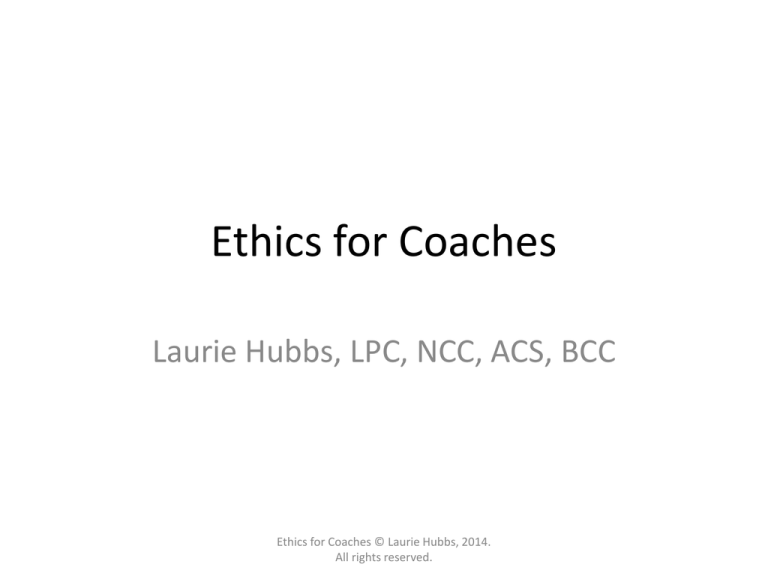
Ethics for Coaches
Laurie Hubbs, LPC, NCC, ACS, BCC
Ethics for Coaches © Laurie Hubbs, 2014.
All rights reserved.
Session One: Ethics and the Coaching
Profession
• Syllabus Review
• Class meetings: Aug 14, 21, 28, Sept 4, & 11
• Weekly small group meetings
– Discussion
– Homework
– Divide up into groups
Ethics for Coaches © Laurie Hubbs, 2014.
All rights reserved.
What is this class all about?
• What kinds of things did you think we would
discuss in a class about Ethics for Coaches?
• One important rule in this class to remember:
In discussion of ethics, there are no wrong
answers. Ideas that are shared help us all
think through the concepts from different
perspectives. So, do not be afraid to share
your ideas.
Ethics for Coaches © Laurie Hubbs, 2014.
All rights reserved.
Ethics Defined
• Ethics
– moral principles that govern a person's or group's
behavior.
– the moral correctness of specified conduct.
– the branch of knowledge that deals with moral
principles.
– a set of moral principles, especially ones relating
to or affirming a specified group, field, or form of
conduct.
Ethics for Coaches © Laurie Hubbs, 2014.
All rights reserved.
Why Do Coaches Need an Ethical
Code?
• Define accepted/acceptable behaviors
• Establish a framework for professional behavior and
responsibilities
• Create a culture of the profession
• Promote high standards of behavior
• Provide benchmark for members to use for selfevaluation
• As a vehicle for occupational identity
• As a mark of occupational maturity
• A means for self-regulation
• A means for self-promotion
Ethics for Coaches © Laurie Hubbs, 2014.
All rights reserved.
Foundations for Ethical Thinking
• Five Approaches to Ethical Decision Making
– Utilitarian Approach
– The Rights Approach
– The Fairness (Justice) Approach
– The Common-Good Approach
– The Virtue Approach
Ethics for Coaches © Laurie Hubbs, 2014.
All rights reserved.
Utilitarian Approach: Ethical actions provide the
greatest balance of good over evil
• Conceived in the 19th century by Jeremy Bentham
and John Stuart Mill
– to help legislators determine which laws were morally
superior.
– 1. Identify the available courses of action.
– 2. Ask (a) who will be affected by each action and (b)
what benefits or harms will be derived from each.
– 3. Choose the action that results in the greatest
benefits and the least harm. The ethical action is the
one that provides the greatest good for the greatest
number.
Ethics for Coaches © Laurie Hubbs, 2014.
All rights reserved.
The Rights Approach: Individuals right to choose
• 18th-century thinker Immanuel Kant and
others like him.
• Actions are wrong when they violate the rights
of individuals; the more serious the violation,
the more wrong the action.
• In deciding whether an action is moral or
immoral we must ask: does the action respect
the moral rights of everyone?
Ethics for Coaches © Laurie Hubbs, 2014.
All rights reserved.
The Fairness (Justice) Approach: How fair is an
action?
• The teachings of Greek philosopher Aristotle,
who said that "equals should be treated
equally and unequals unequally."
• The basic moral question in this approach is:
How fair is an action? Does it treat everyone
in the same way, or does it show favoritism
and discrimination?
Ethics for Coaches © Laurie Hubbs, 2014.
All rights reserved.
The Common Good Approach: An individual’s
good is inextricably linked to the good of the
community
• Originated with Plato, Aristotle, and Cicero.
• Ethicist John Rawls defines the common good as "certain
general conditions that are...equally to everyone's
advantage."
• Focus on ensuring that the social policies, social systems,
institutions, and environments beneficial to everyone.
– Examples of goods common to all include affordable health
care, a just legal system, and an unpolluted environment.
• While respecting and valuing individual freedoms, the
common-good approach challenges us to recognize and
further those goals we all share.
Ethics for Coaches © Laurie Hubbs, 2014.
All rights reserved.
The Virtue Approach: Strives for the
full development of our humanity
• Assumes that there are certain ideals toward which we
should strive.
• Focus on developing our highest potential.
– Honesty, courage, compassion, generosity, fidelity, fairness
• The virtuous person is the ethical person.
• The Virtue Approach asks, What kind of person should I
be? What will promote the development of my character
and that of my community?
Ethics for Coaches © Laurie Hubbs, 2014.
All rights reserved.
Small group meeting
• Download worksheet from LaurieHubbs.com
• Complete worksheet
• In small group discuss worksheet and come to
class prepared to share your group process
Ethics for Coaches © Laurie Hubbs, 2014.
All rights reserved.





